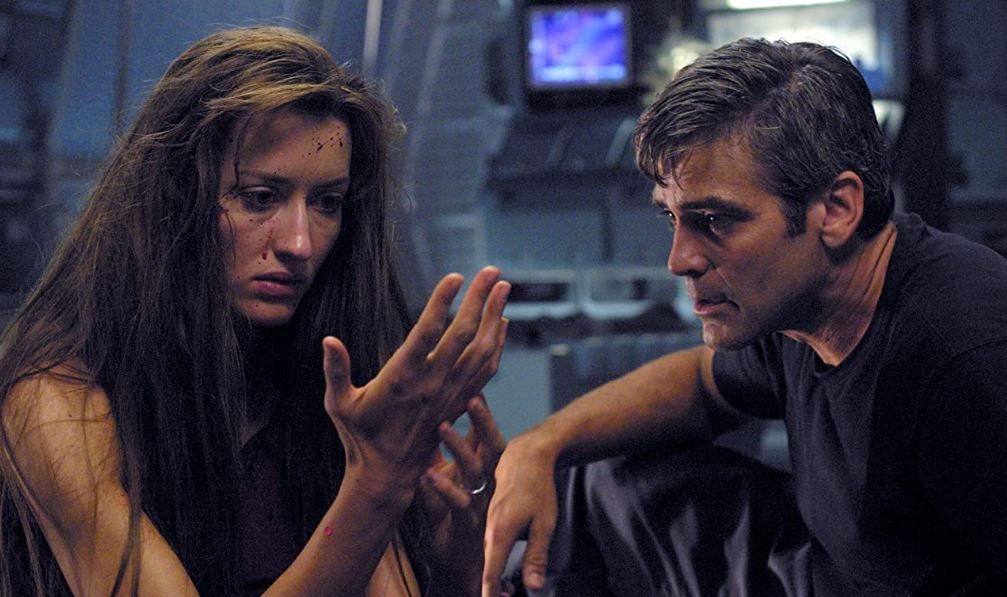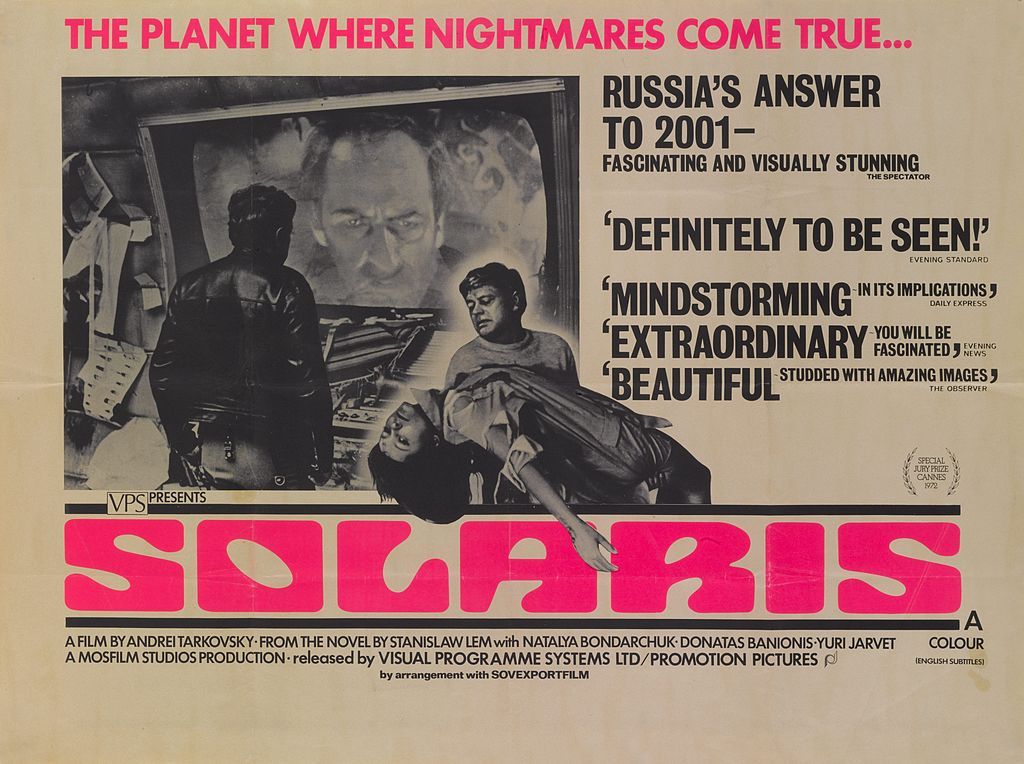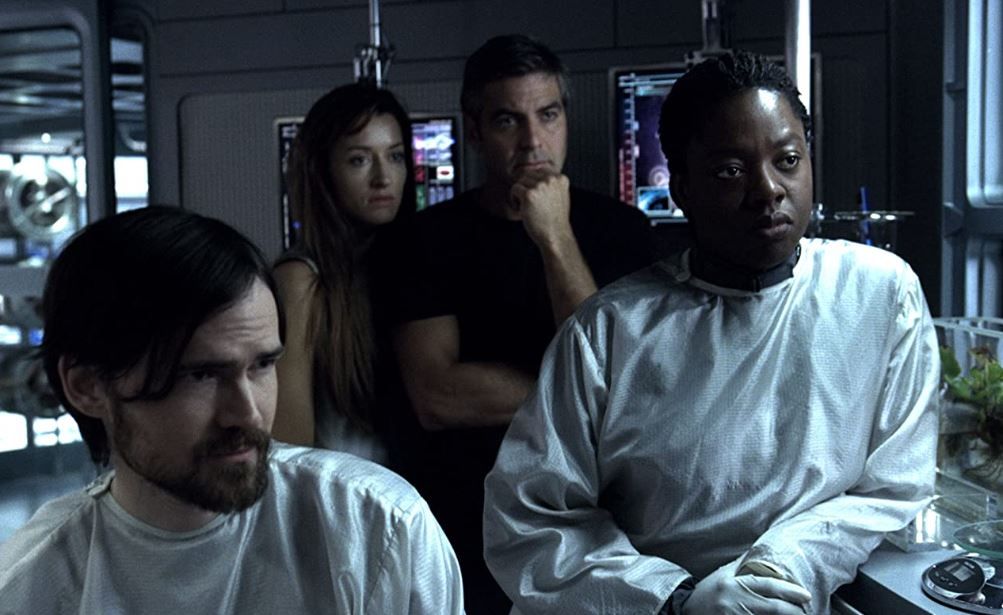

Share
27th November 2022
06:00am GMT

 Given all the above, it’s fair to say that anticipation for the movie was quite high. However, the film wound up being a box office disappointment, grossing just $30 million on a $47 million budget.
And while some critics were kind to Solaris – the late and great Roger Ebert was one of its champions – certain audience members reacted to it with hostility, with the film earning a rare F grade from CinemaScore, a market research firm that monitors audience responses to movies through surveys.
That said, revisiting Solaris 20 years after its release, it’s clear that its failure at the box office and the initial negative response it provoked in moviegoers had little to do with its quality.
For one, it retains the incredible premise of the novel and the Tarkovsky film - a group of astronauts observing a planet, who find the celestial body gazing back into them, plumbing the depths of their subconscious.
Also, like the 1972 original, the 2002 movie eschews the type of bombastic action or horror one might expect from a sci-fi tale, instead emphasising the emotional states of its characters.
As well as this, both versions take a minimalist and grounded approach to their fantastical story and as such feel like what might actually happen if humans were to be confronted with such a situation.
Given all the above, it’s fair to say that anticipation for the movie was quite high. However, the film wound up being a box office disappointment, grossing just $30 million on a $47 million budget.
And while some critics were kind to Solaris – the late and great Roger Ebert was one of its champions – certain audience members reacted to it with hostility, with the film earning a rare F grade from CinemaScore, a market research firm that monitors audience responses to movies through surveys.
That said, revisiting Solaris 20 years after its release, it’s clear that its failure at the box office and the initial negative response it provoked in moviegoers had little to do with its quality.
For one, it retains the incredible premise of the novel and the Tarkovsky film - a group of astronauts observing a planet, who find the celestial body gazing back into them, plumbing the depths of their subconscious.
Also, like the 1972 original, the 2002 movie eschews the type of bombastic action or horror one might expect from a sci-fi tale, instead emphasising the emotional states of its characters.
As well as this, both versions take a minimalist and grounded approach to their fantastical story and as such feel like what might actually happen if humans were to be confronted with such a situation.

 And given his perception of the relationship is tainted by tragedy, does this mean that if he and this version of Rheya did start a romantic relationship, it would inevitably also end badly?
And also, why is Solaris manifesting these loved ones? And do the loved ones that reappear have an ulterior, nefarious motive?
Clooney does some of his best-ever work playing the haunted, rational Chris who at first responds with terror to seeing his dead wife alive again before gradually coming to see the strange phenomena as a second chance for the pair.
McElhone - who was recently back on screens in The Crown season five - is wonderful too, essentially playing two different characters - the Rheya that Chris knew on Earth and the one who shows up on the space station that begins to question her very existence.
Also among the main cast is the excellent Jeremy Davies as Snow, who first appears to be just comic relief - at one point, he muses about the visitors: "I wonder if they can get pregnant". However, there is more than meets the eye with the character.
Viola Davis is also her typically commanding self in one of her earliest major roles, going toe-to-toe with Clooney's character as Dr Gordon - who believes Rheya and the other visitors should be terminated.
At the same, virtually every shot in the film is beautifully composed and cut by Soderbergh (on top of writing and directing the movie, he edited and served as cinematographer on it under a pseudonym).
Blue is often the dominant colour in scenes - enhancing the feeling of sorrow, along with composer Cliff Martinez's swoony melancholic electro-tinged score.
Clip via thepetrosian
Even with all these great qualities, however, Solaris was released in the aftermath of a string of more traditional blockbuster sci-fi films like Alien: Resurrection, Armageddon, Deep Impact, Independence Day, The Fifth Element and Starship Troopers.
And given the fact that Solaris purposely avoids car chases, gun fights and killer aliens in favour of a "journey into the subconscious", Soderbergh has conceded it was always going to be a tough sell to viewers.
To try to entice viewers into seeing it, its trailers were cut to make it appear more action-packed.
As such, it's likely the marketing of Solaris as a more straightforward genre movie is what led to a lot of annoyed audience members and bad buzz after it premiered.
In the aforementioned DVD commentary, Cameron and Soderbergh reflected on this, sharing the following exchange.
And given his perception of the relationship is tainted by tragedy, does this mean that if he and this version of Rheya did start a romantic relationship, it would inevitably also end badly?
And also, why is Solaris manifesting these loved ones? And do the loved ones that reappear have an ulterior, nefarious motive?
Clooney does some of his best-ever work playing the haunted, rational Chris who at first responds with terror to seeing his dead wife alive again before gradually coming to see the strange phenomena as a second chance for the pair.
McElhone - who was recently back on screens in The Crown season five - is wonderful too, essentially playing two different characters - the Rheya that Chris knew on Earth and the one who shows up on the space station that begins to question her very existence.
Also among the main cast is the excellent Jeremy Davies as Snow, who first appears to be just comic relief - at one point, he muses about the visitors: "I wonder if they can get pregnant". However, there is more than meets the eye with the character.
Viola Davis is also her typically commanding self in one of her earliest major roles, going toe-to-toe with Clooney's character as Dr Gordon - who believes Rheya and the other visitors should be terminated.
At the same, virtually every shot in the film is beautifully composed and cut by Soderbergh (on top of writing and directing the movie, he edited and served as cinematographer on it under a pseudonym).
Blue is often the dominant colour in scenes - enhancing the feeling of sorrow, along with composer Cliff Martinez's swoony melancholic electro-tinged score.
Clip via thepetrosian
Even with all these great qualities, however, Solaris was released in the aftermath of a string of more traditional blockbuster sci-fi films like Alien: Resurrection, Armageddon, Deep Impact, Independence Day, The Fifth Element and Starship Troopers.
And given the fact that Solaris purposely avoids car chases, gun fights and killer aliens in favour of a "journey into the subconscious", Soderbergh has conceded it was always going to be a tough sell to viewers.
To try to entice viewers into seeing it, its trailers were cut to make it appear more action-packed.
As such, it's likely the marketing of Solaris as a more straightforward genre movie is what led to a lot of annoyed audience members and bad buzz after it premiered.
In the aforementioned DVD commentary, Cameron and Soderbergh reflected on this, sharing the following exchange.
James Cameron: I think people weren’t expecting the film to be as emotional and spare in all other ways, other than that, other than the relationship [between Chris and Rheya]. Steven Soderbergh: For a lot of people, that was a difficult thing to get past because it is so lean in that regard… Running against the grain. I think, in retrospect, people needed more preparation for that. The fact that the film wasn’t finished until very, very close to the release date meant that maybe we should have pushed, maybe we should have had more time to screen the film and come up with a campaign that gave people a sense of the experience that they were about to have because it was a difficult movie to encapsulate in a poster or a trailer or a TV spot. James Cameron: We’d look at posters and say: ‘That gets part of it but it doesn’t get the essence of it.' Steven Soderbergh: No, I don’t think we ever quite solved it.However, 20 years after its release and now unburdened by expectations, Solaris is waiting to be rediscovered as a beautiful and haunting sci-fi gem by those who may have panned it in 2002.
Explore more on these topics:

The JOE Film Club Quiz: Week 84
movies tv